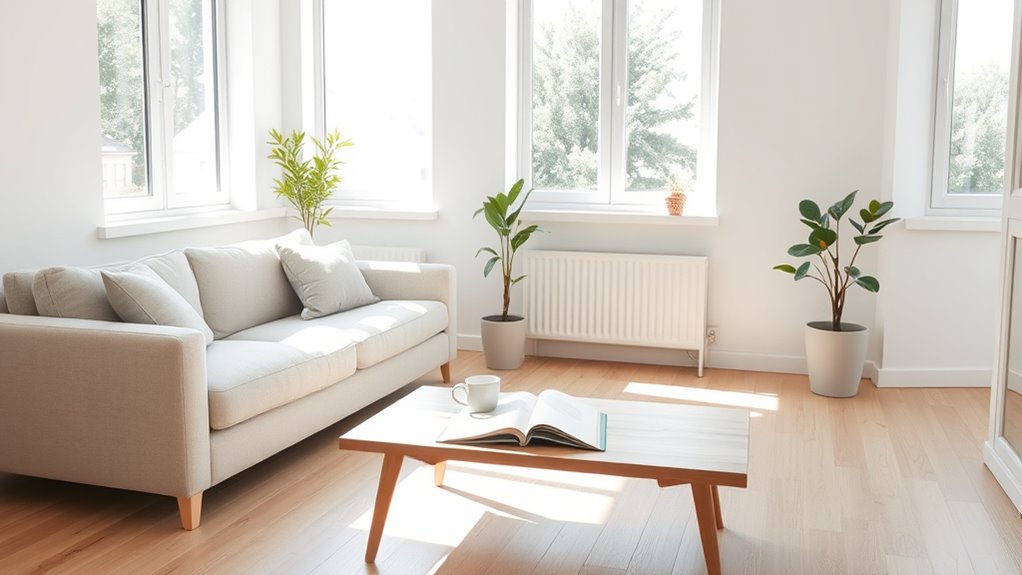Less clutter in your home means less stress and anxiety. When you prioritize simplicity, you create a serene environment that enhances your mood and wellbeing. Fewer possessions lead to improved focus, productivity, and decision-making, freeing up mental energy for what truly matters. Plus, embracing minimalism promotes financial freedom and a healthier planet. Enjoy the joy of intentional living, and you'll uncover even more happiness hidden in your space.
Key Takeaways
- Reducing clutter lowers stress and anxiety, fostering a more peaceful and joyful home environment.
- Minimalism enhances focus and productivity, creating space for meaningful activities and experiences.
- Decluttering improves mood and self-esteem, promoting a sense of accomplishment and well-being.
- Living with less encourages mindful purchasing, leading to financial stability and freedom.
- A simplified home supports deeper connections and authentic relationships, enhancing overall happiness.
The Connection Between Clutter and Stress
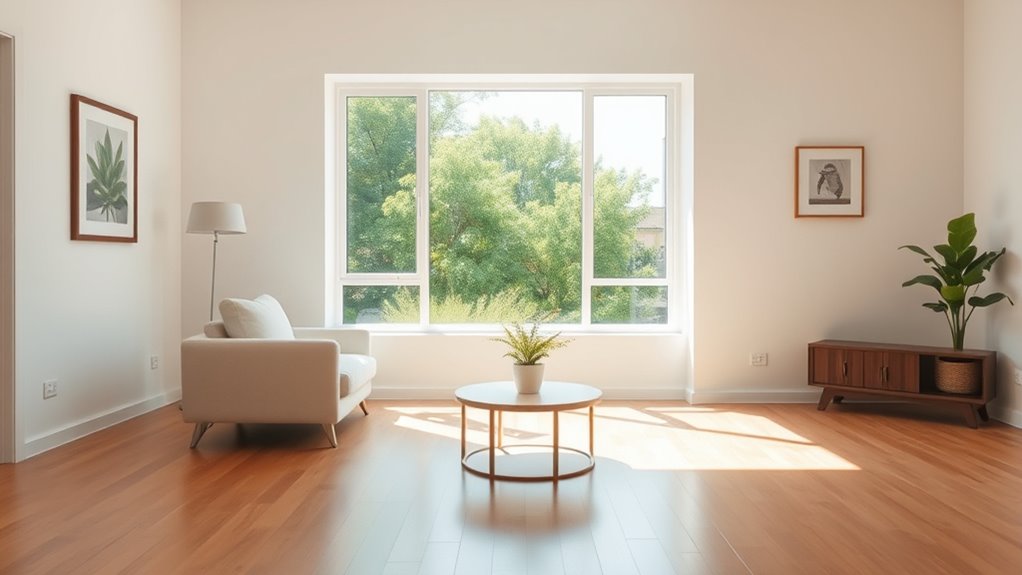
When you look around your home and see clutter, it's not just a visual nuisance; it can actually elevate your stress levels. Clutter creates a constant low-grade fight or flight response, leading to heightened anxiety and even depression. You may find it harder to interpret emotional expressions or maintain healthy relationships due to this overwhelming environment. Cognitive overload from clutter reduces your brain's efficiency, making daily tasks feel more daunting. Studies have shown that clutter raises cortisol levels, particularly in women, contributing to physical health risks and sleep disturbances. Additionally, clutter negatively impacts working memory, making it even more challenging to navigate everyday life. Creating a clutter-free space not only enhances your environment but also promotes a sense of calm and well-being.
Enhancing Focus Through Minimalism
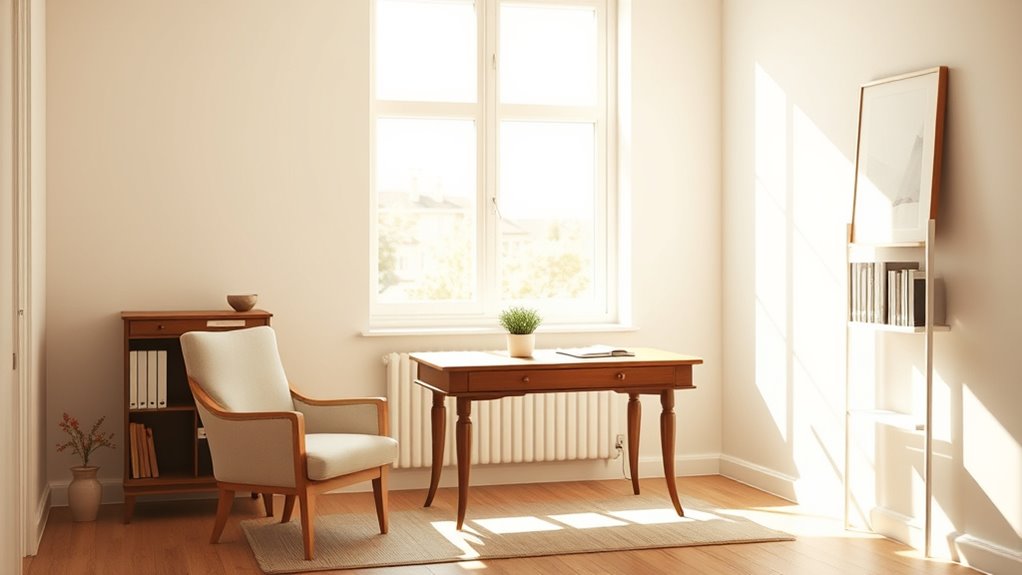
Clutter not only heightens stress but also hampers your ability to focus. Embracing minimalism can significantly enhance your concentration by reducing cognitive load and eliminating unnecessary distractions. With fewer items competing for your attention, you'll find it easier to dive into essential tasks, boosting your productivity. Minimalism also simplifies decision-making, conserving mental energy for what truly matters. A clear and organized workspace fosters enhanced clarity, making it easier to stay on track. Additionally, minimalism encourages mindfulness, helping you focus on intentional living. By highlighting the importance of simplicity, minimalism creates an environment that supports better decision-making and user satisfaction. This practice also reduces stress levels, promoting a sense of calm that further benefits your overall well-being.
The Mental Health Benefits of Decluttering
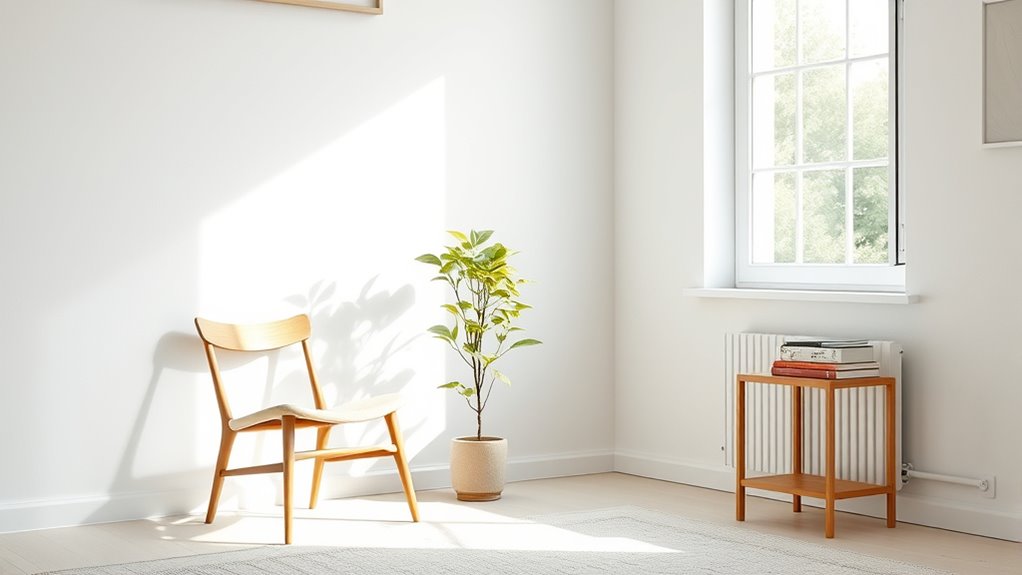
Living in a cluttered environment can weigh heavily on your mental health, as it creates a chaotic atmosphere that often mirrors your internal state. Decluttering your space can significantly reduce stress and anxiety by eliminating visual distractions, which helps lower cortisol levels. You'll likely notice an improvement in your mood and self-esteem as you take control of your environment, leading to a sense of accomplishment. Additionally, reducing clutter fosters a sense of calm and can help sharpen your focus, allowing for better productivity. A tidy home promotes relaxation, allowing for better focus and productivity. Moreover, maintaining a clean space can support a healthier lifestyle by promoting cleanliness and hygiene. Plus, decluttering encourages mindfulness and can enhance your creativity, giving your mind the clarity it needs. Ultimately, regular decluttering supports not just a healthier environment but also a happier, more confident you. Embrace the benefits and enjoy the mental clarity that comes with it.
Financial Freedom Through Simple Living
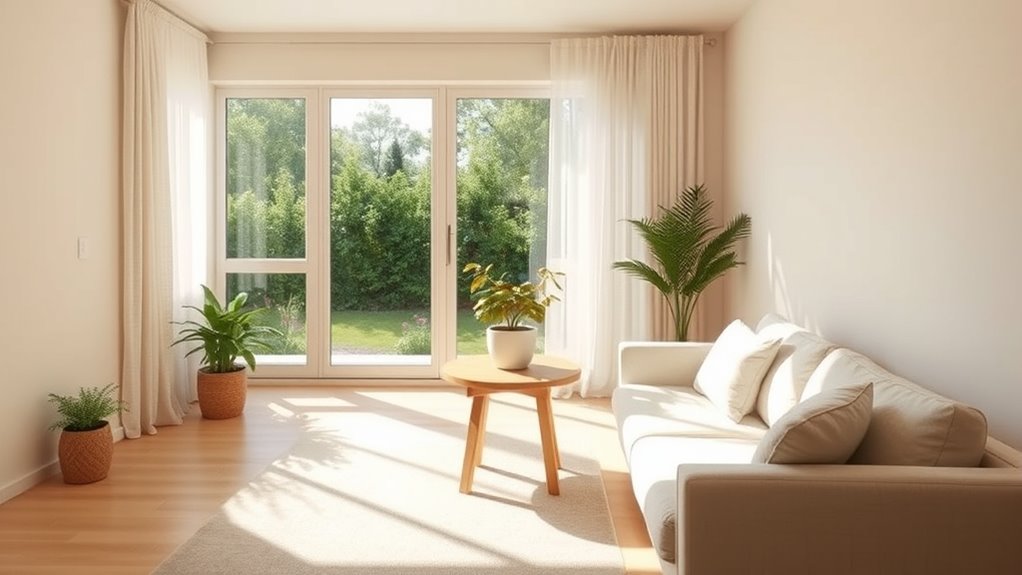
A clearer, more organized home not only boosts your mental well-being but can also lead to significant financial benefits.
Living with less can reduce your expenses, allowing you to save more money and focus on what truly matters. By prioritizing experiences over material possessions, you enhance your financial stability, making it easier to meet monthly obligations and even enjoy some financial freedom. The practice of mindful purchasing encourages you to invest in items that truly add value to your life. Many Americans define financial freedom as being debt-free or living comfortably, and simplifying your life can help you achieve these goals. The less you own, the more control you have over your spending habits, leading to reduced stress. Additionally, more than half of respondents feel far from their personal financial freedom, highlighting the importance of taking actionable steps toward achieving it.
With fewer distractions, you can prioritize long-term financial planning and ultimately enjoy a more secure, fulfilling life.
The Environmental Impact of Reducing Consumption
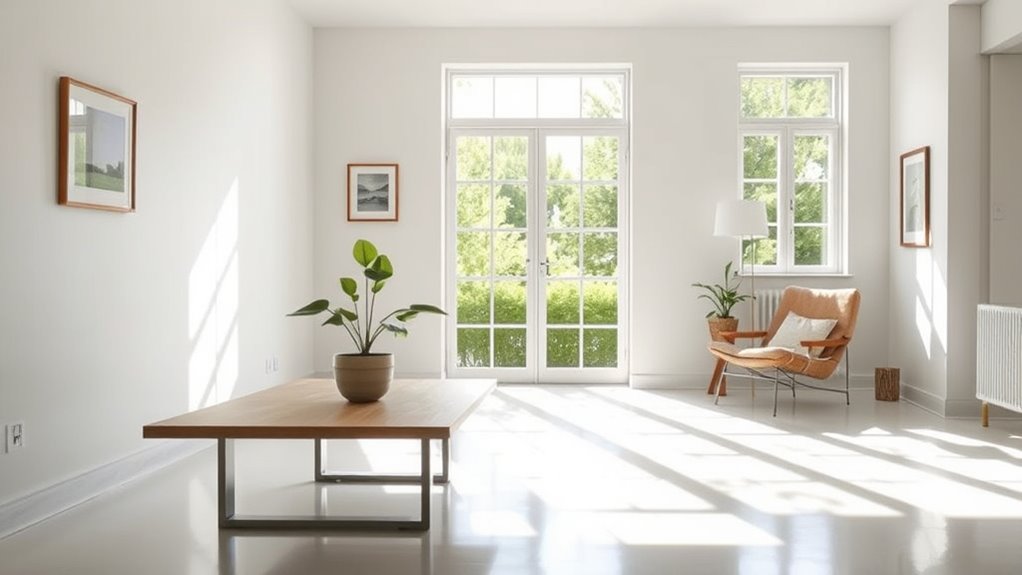
When you choose to reduce your consumption, you're not just simplifying your life; you're also making a significant positive impact on the environment.
By buying less, you cut down on greenhouse gas emissions tied to production and transportation. This means cleaner air and reduced pollution, fostering a healthier planet. Moreover, overconsumption threatens natural resources and by consuming less, you contribute to preserving them for future generations. Using eco-friendly practices, such as burning dry wood, can further enhance your commitment to sustainability.
Reducing purchases lowers greenhouse gas emissions, leading to cleaner air and a healthier planet.
You also generate less waste, which helps keep landfills and oceans cleaner. Moreover, conserving resources like water and minerals slows down their depletion, ensuring they're available for future generations.
By consuming less, you lessen the pressure on ecosystems, preserving biodiversity and reducing deforestation.
Ultimately, your mindful choices contribute to a more sustainable future, helping combat climate change and promoting a thriving environment for all.
Time Management and Productivity Gains
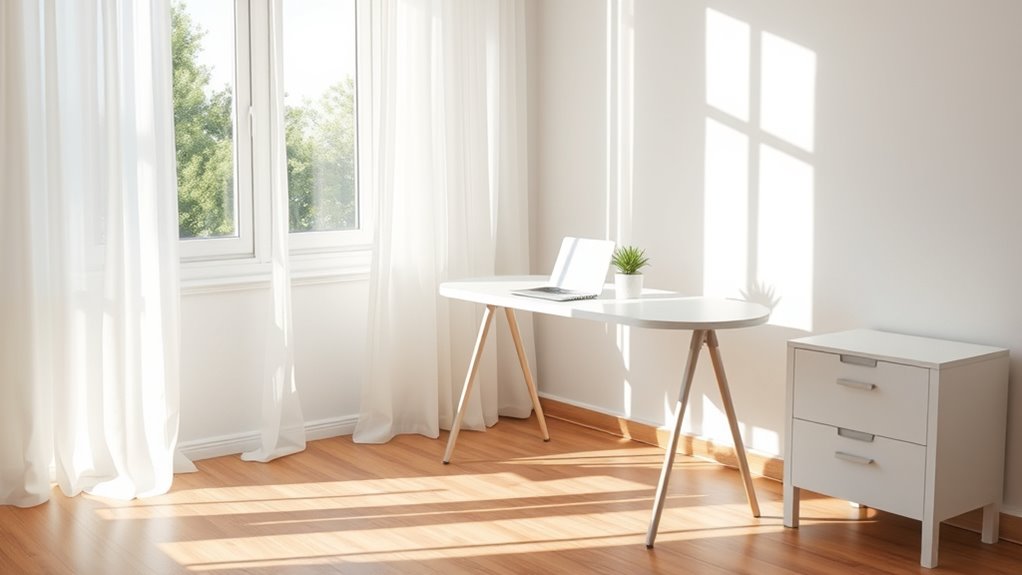
Effective time management isn't just about making schedules; it's a powerful tool for boosting productivity and enhancing your overall happiness.
By focusing on essentials, you prioritize tasks that truly matter and eliminate non-essential activities. Simplifying your schedule reduces clutter, allowing you to concentrate on key commitments without the chaos. This approach aligns with minimalism's emphasis on prioritization, leading to a more intentional use of your time. Additionally, incorporating techniques from personal development can further improve your time management skills.
Avoid multitasking; concentrating on one task at a time improves both efficiency and the quality of your work. Implement structured routines to maintain consistency and minimize distractions, which can significantly enhance productivity.
Strengthening Relationships in a Minimalist Lifestyle
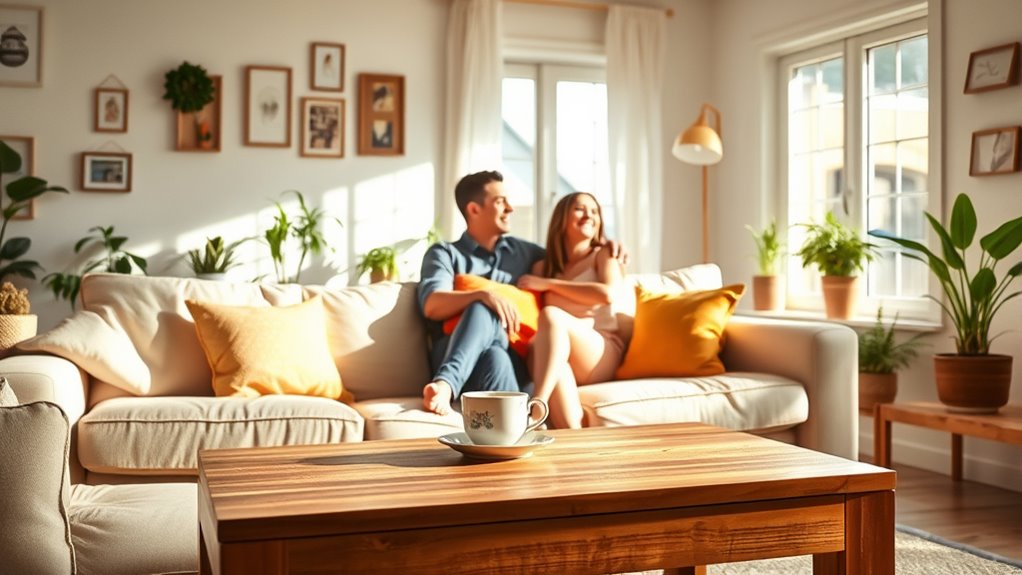
Managing your time effectively can create not just more free hours but also a more fulfilling life. Embracing a minimalist lifestyle strengthens your relationships by reducing stress and clutter, fostering a calmer home atmosphere. By implementing smart tips for cozy living, you can create a space that enhances your well-being.
You'll find that with fewer distractions, meaningful conversations and quality time with family and friends become more accessible. This focus on experiences over possessions nurtures deeper connections and allows you to appreciate what truly matters. Additionally, a calmer home environment promotes better relationships, as it enables everyone to feel more at ease and open with one another.
You'll also cultivate empathy and understanding, as a tidy environment encourages active listening and compassion. By prioritizing emotional well-being, you create a supportive atmosphere where everyone contributes to maintaining harmony.
Ultimately, less stuff paves the way for more authentic interactions and lasting memories with those you love.
Embracing a Mindset Shift Towards Minimalism
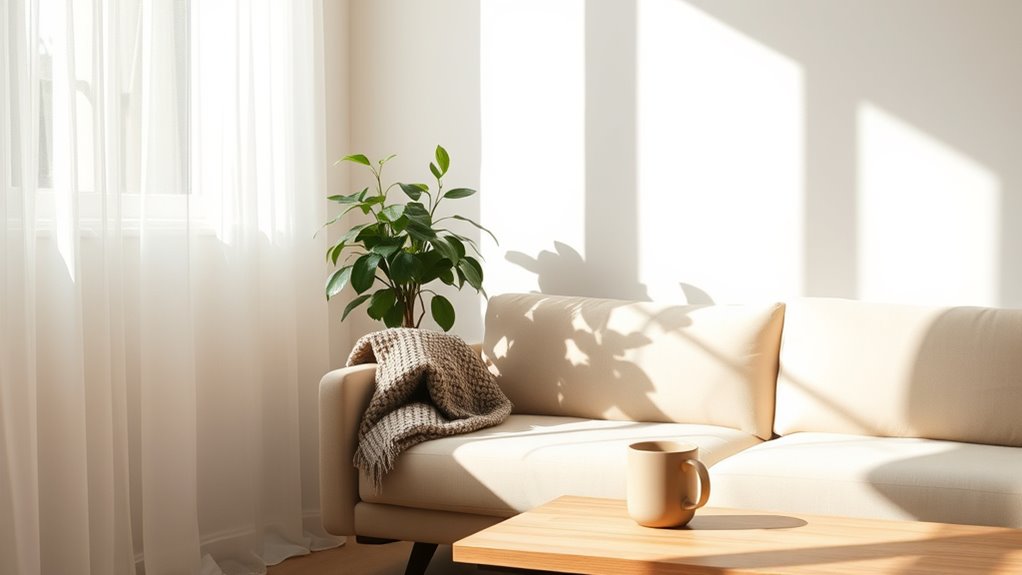
As you begin to embrace minimalism, you'll notice a profound shift in your perspective on life and what truly matters. This lifestyle emphasizes simplicity and intentionality, helping you focus on experiences over possessions. By reducing physical clutter, you create mental space, enhancing clarity and reducing stress. You'll find that prioritizing meaningful activities fosters happiness and fulfillment. Minimalism also encourages mindful purchasing, allowing you to allocate resources wisely and save financially. As you simplify your life, you'll likely experience improved productivity and mental health. Psychological minimalism also emphasizes identifying and letting go of burdensome thoughts, which aligns your actions with your values, bringing you peace and purpose. Additionally, incorporating antioxidant-rich foods into your diet can further enhance your mental clarity and support your minimalist journey. Embracing this mindset shift paves the way for a more intentional, sustainable, and joyful life.
The Joy of Intentional Living
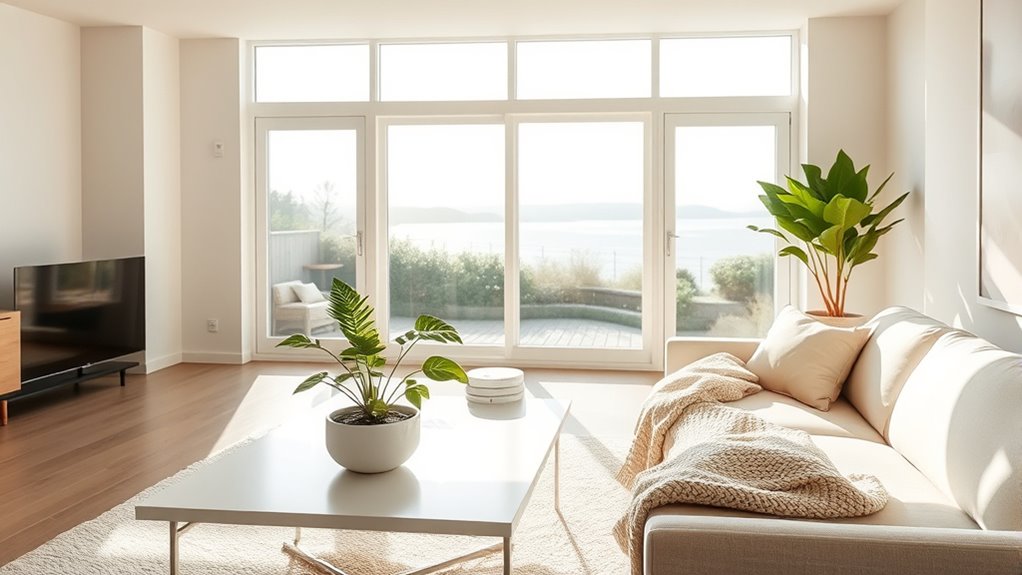
When you choose to live intentionally, you open the door to a deeper sense of joy and fulfillment in your everyday life. By aligning your actions with your core values, you reduce stress and enhance your mental health. This clarity fosters emotional resilience, helping you navigate challenges with ease. Intentional living also strengthens your relationships, as healthy boundaries and open communication flourish. Additionally, it is linked to lower levels of daily distress, which leads to increased happiness and life satisfaction. You'll find yourself more present, savoring each moment, which leads to increased happiness and life satisfaction. As you prioritize meaningful activities, your time management improves, and your actions become purposeful. Embracing this lifestyle encourages ongoing self-awareness, allowing you to grow and adapt, ultimately enriching your life and those around you. Adopting a growth mindset can further enhance your ability to overcome obstacles and thrive in your intentional living journey.
Frequently Asked Questions
How Do I Start Decluttering My Home Effectively?
To start decluttering your home effectively, first identify the most cluttered areas.
Create a checklist to prioritize your tasks, and tackle one space at a time.
You might begin with the Four Box Method: sort items into Trash, Storage, Put Away, and Give Away/Sell.
Aim to remove five items daily, or simply one item each day.
This way, you'll build a habit without feeling overwhelmed, making the process more manageable and enjoyable.
What Are the First Steps to Adopting a Minimalist Lifestyle?
Did you know that over 80% of the items in your home are rarely used? To adopt a minimalist lifestyle, start with a clutter audit, assessing your possessions to identify what you truly need.
Next, declutter by sorting items into categories: keep, donate, or discard.
Set personal goals to stay motivated, and build a support system with friends who share your journey.
These first steps will guide you toward a more intentional and fulfilling life.
Can Minimalism Improve My Creativity and Self-Expression?
Absolutely, minimalism can boost your creativity and self-expression.
By decluttering your space, you create an environment that feels spacious and freeing, which encourages innovative thinking.
You'll find that focusing on fewer, meaningful possessions allows you to connect more deeply with your values and ideas.
This clarity not only enhances your creative processes but also helps you express yourself authentically, leading to a more fulfilling and inspired life.
How Do I Maintain a Minimalist Lifestyle Long-Term?
You might think maintaining a minimalist lifestyle is too restrictive, but it's actually about freedom.
To sustain minimalism long-term, start by implementing the one-in, one-out rule. Regularly declutter your space and focus on quality over quantity in your purchases.
Engage in hobbies that fulfill you instead of shopping. Simplify your routines and reflect on what truly adds value to your life.
These steps will help you enjoy a clutter-free, purposeful existence.
What Are Common Misconceptions About Minimalism?
You might think minimalism is about owning as few items as possible or achieving a perfect space, but that's not the case.
It's a lifestyle focused on intentionality, not deprivation. You don't have to spend less or live by strict rules.
Instead, minimalism can adapt to your needs, helping you prioritize what truly matters. It's about simplifying life to create more freedom, joy, and meaningful experiences, rather than just reducing clutter.
Conclusion
In your journey toward a happier home, less really can mean more. Just like a breath of fresh air clears your mind, decluttering opens up space for joy and connection. By embracing minimalism, you'll find stress melts away, focus sharpens, and relationships deepen. As you shift your mindset, intentional living becomes a rewarding adventure, leading to financial freedom and a lighter environmental footprint. So, take that first step and watch your happiness flourish in the simplicity.
